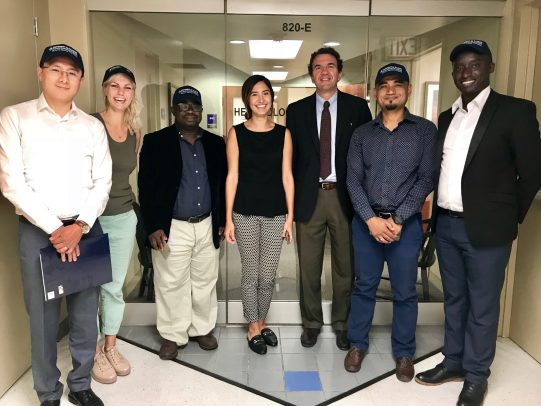UIC initiative provides support to international bone marrow transplant programs

Training program participants and staff (from left): Dr. Ariel Amaru (San Andres University, La Paz, Bolivia); Dr. Kateryna Filonenko (National Cancer Institute, Kyiv, Ukraine); Dr. Olowoselubaba Olowoselu (University of Lagos, Lagos, Nigeria); Amanda Rivera, Global BMT program assistant, UIC hematology-oncology staff; Damiano Rondelli Global BMT initiative founder and director and chief of hematology/oncology; Dr. Sampurna Tuladhar, (Civil Service Hospital BMT Program, Kathmandu, Nepal), and Dr. Ronald Mbiine (Makerere University, Kampala, Uganda).
Bone marrow transplants can cure some blood cancers and related diseases, but care disparities for these afflictions still exist in low- and middle-income countries. One initiative at UIC is addressing this problem head on.
The UIC Global Blood & Marrow Transplant (BMT) Training Program funds travel and stay for physicians from around the world who want to improve or develop bone transplant programs in their own countries. This year, five participants from Nigeria, Uganda, Bolivia, Nepal and Ukraine have already begun the two-month training curriculum, which will last until Sept. 28.
“The main goal is to contribute to building capacity and to increase the networking in BMT for international countries,” said Damiano Rondelli, the Michael Reese Professor of Hematology, chief of hematology/oncology, director of the Blood and Marrow Transplant program, and associate director for global partnerships for UIC’s Center for Global Health.
UIC Global BMT participants will observe in inpatient and outpatient wards, the apheresis facility, Clinical Stem Cell Lab, HLA lab, Infectious Disease Consultation rounds, Quality Management meetings and BMT planning meetings. Twelve lectures on BMT topics, journal clubs and one-on-one sessions with faculty are also planned.
“This work that starts here can continue down the line with us but also among themselves,” Rondelli said. “The relevance of this training is that it can actually result in saving many lives.”
The combined efforts of UI Health, the department of medicine and the UIC Center for Global Health help make the program possible.
